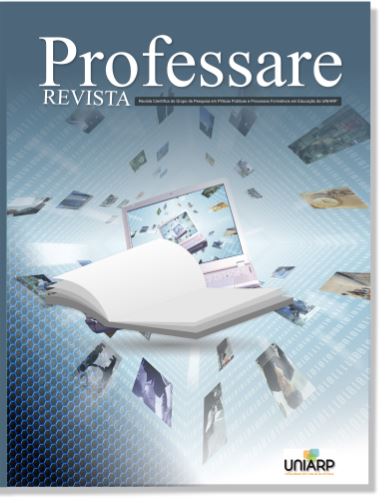DESENVOLVIMENTO DA FALA INFANTIL: NEUROLINGUÍSTICA E AQUISIÇÃO DA LINGUAGEM EM CRIANÇAS BILÍNGUES
DEVELOPMENT OF CHILD SPEECH: NEUROLINGUISTICS AND LANGUAGE ACQUISITION IN BILINGUAL CHILDREN
DOI:
https://doi.org/10.33362/professare.v12i2.3157Palavras-chave:
Desenvolvimento cognitivo, Neurolinguística, Processos cognitivos, Bilinguismo, Desenvolvimento linguísticoResumo
Nesse artigo, com temática voltada ao bilinguismo, serão investigados aspectos cognitivos da criança bilíngue e desdobramentos que a segunda língua pode trazer a sua vida acadêmica e social. Amparadas pelos Estudos Gerais de Linguística de Saussure, pelo Desenvolvimento Cognitivo das Crianças de Piaget, na Gramática Geral de Chomsky e na exposição sociocultural de Vygotsky, versamos sobre como crianças bilíngues desenvolvem mais atenção, além de discutir a questão de crianças no Espectro Autista, que apesar de nunca terem tido contato com uma segunda língua antes, são capazes de falar ambas línguas fluentemente. O artigo tem como base a observação de crianças haitianas e portadoras do Transtorno do Espectro Autista (TEA), com ou sem dificuldade de fala e linguagem de uma escola municipal de uma cidade do interior de Santa Catarina e como as práticas pedagógicas e as vivências sociais das crianças enquadradas no contexto escolar beneficiaram o desenvolvimento, tornando-as bilíngues. As crianças em questão foram observadas durante dois anos em atividades cotidianas nas quais eram expostas ou apresentavam algum tipo de interação em uma língua estrangeira, de forma que pudesse ser observado o processo de aquisição de língua estrangeira de cada indivíduo.
Palavras-chaves: Desenvolvimento cognitivo. Bilinguismo. Neurolinguística. Desenvolvimento linguístico. Processos cognitivos.
ABSTRACT
In this article, focused on bilingualism, we will investigate the cognitive aspects of bilingual children and the implications that the second language can have on their academic and social life. Drawing on Saussure's General Linguistics Studies, Piaget's Cognitive Development of Children, Chomsky's Universal Grammar, and Vygotsky's sociocultural exposition, we discuss how bilingual children develop increased attention and also explore the issue of children on the Autism Spectrum, who, despite never having been exposed to a second language before, are capable of speaking both languages fluently. The article is based on the observation of Haitian children with Autism Spectrum Disorder (ASD), with or without speech and language difficulties, in a municipal school in a city in the interior of Santa Catarina, and how the pedagogical practices and social experiences within the school context contributed to their bilingual development. The children in question were observed for two years during everyday activities in which they were exposed to or engaged in some form of interaction in a foreign language, allowing us to observe the process of foreign language acquisition for each individual.
Keywords: Cognitive development. Bilingualism. Neurolinguistics. Linguistic Development. Cognitive processes.
Referências
BARAC, R.; BIALYSTOK, E. Bilingual effects on cognitive and linguistic development: role of language, cultural background, and education: Language, culture, education, and bilingualism. Child development, v. 83, n. 2, p. 413–422, 2012.
BIALYSTOK, E. et al. Bilingualism, aging, and cognitive control: evidence from the Simon task. Psychology and aging, v. 19, n. 2, p. 290–303, 2004.
BIALYSTOK, E. Bilingualism in development: Language, literacy, and cognition. Cambridge, England: Cambridge University Press, 2009.
BIALYSTOK, E. Bilingualism and the development of executive function: The role of attention. Child development perspectives, v. 9, n. 2, p. 117–121, 2015.
BIALYSTOK, E.; MARTIN, M. M.; VISWANATHAN, M. Bilingualism across the lifespan: The rise and fall of inhibitory control. The international journal of bilingualism: cross-disciplinary, cross-linguistic studies of language behavior, v. 9, n. 1, p. 103–119, 2005.
CARLSON, S. M.; MELTZOFF, A. N. Bilingual experience and executive functioning in young children. Developmental science, v. 11, n. 2, p. 282–298, 2008.
CHOMSKY, N. Review of Skinner's Verbal Behavior. Language, v. 35 n.1, p. 26-58, 1959.
COSTA, A.; HERNÁNDEZ, M.; SEBASTIÁN-GALLÉS, N. Bilingualism aids conflict resolution: evidence from the ANT task. Cognition, v. 106, n. 1, p. 59–86, 2008.
FLICK, U. Pesquisa qualitativa: por que e como fazê-la. In: FLICK, U. (Org.). Introdução à pesquisa qualitativa. Trad. Joice Elias Costa. 3. ed. Porto Alegre: Artmed, 2009, p.95-108
GUENTHER, F. H. Neural control of speech. Disponível em: https://mitpress.mit.edu/9780262034715/neural-control-of-speech/. Acesso em: 16 maio. 2023.
KAUSHANSKAYA, M.; MARIAN, V. Bilingualism reduces native-language interference during novel-word learning. Journal of experimental psychology. Learning, memory, and cognition, v. 35, n. 3, p. 829–835, 2009.
KAUSHANSKAYA, M; MARIAN, V.; BLUMENFELD, H. K. The Language Experience and Proficiency Questionnaire (LEAP-Q): assessing language profiles in bilinguals and multilinguals. Journal of speech, language, and hearing research: JSLHR, v. 50, n. 4, p. 940–967, 2007.
OHASHI, J. K. et al. Comparing early language development in monolingual- and bilingual- exposed young children with autism spectrum disorders. Research in autism spectrum disorders, v. 6, n. 2, p. 890–897, 2012.
PARADIS, J.; GENESEE, F. Syntactic acquisition in bilingual children: Autonomous or interdependent? Studies in second language acquisition, v. 18, n. 1, p. 1–25, 1996.
PARADIS, J.; GENESEE, F.; CRAGO, M. Dual language development and disorders: A handbook on bilingualism and second language learning. [s.l.] Brookes Publishing., 2004.
PIAGET, J. Part I: Cognitive development in children: Piaget development and learning. Journal of research in science teaching, v. 2, n. 3, p. 176–186, 1964.
PLIATSIKAS, C.; LUK, G. Executive control in bilinguals: A concise review on fMRI studies. Bilingualism (Cambridge, England), v. 19, n. 4, p. 699–705, 2016.
ROSEBERRY, S.; HIRSH-PASEK, K.; GOLINKOFF, R. M. Skype me! Socially contingent interactions help toddlers learn language. Child development, v. 85, n. 3, p. 956–970, 2014.
RUPIPER, M. et al. Guiding children’s social development and learning: Theory and skills. 9. ed. Mason, OH, USA: CENGAGE Learning Custom Publishing, 2016.
SAUSSURE, F. Curso de Linguística Geral. 2016. Disponível em: https://pt.scribd.com/document/422183211/SAUSSURE-1916-Curso-de-Linguistica-Geral. Acesso em: 16 maio 2023.
TAGER-FLUSBERG, H.; JOSEPH, R. M. Identifying neurocognitive phenotypes in autism. Philosophical transactions of the Royal Society of London. Series B, Biological sciences, v. 358, n. 1430, p. 303–314, 2003.
TOMASELLO, M. Origins of human communication. 2010. Disponível em: https://mitpress.mit.edu/9780262515207/origins-of-human-communication/. Acesso em: 16 maio. 2023.
VYGOTSKY, L. S. Mind in Society The Development of Higher Psychological Processes. 1978. Cambridge, MA Harvard University Press. Scientific Research Publishing. Disponível em: https://scirp.org/reference/referencespapers.aspx?referenceid=2107373. Acesso em: 16 maio 2023.
Downloads
Publicado
Como Citar
Edição
Seção
Licença
Copyright (c) 2023 Professare

Este trabalho está licenciado sob uma licença Creative Commons Attribution-NonCommercial-NoDerivatives 4.0 International License.
Autores que publicam nesta revista concordam com os seguintes termos:- Autores mantém os direitos autorais e concedem à Revista o direito de primeira publicação, com o trabalho simultaneamente licenciado sob a Licença Creative Commons Attribution que permite o compartilhamento do trabalho com reconhecimento da autoria e publicação inicial nesta Revista.
- Autores têm autorização para assumir contratos adicionais separadamente, para distribuição não-exclusiva da versão do trabalho publicada nesta Revista (ex.: publicar em repositório institucional ou como capítulo de livro), com reconhecimento de autoria e publicação inicial nesta Revista.
- Autores têm permissão e são estimulados a publicar e distribuir seu trabalho online (ex.: em repositórios institucionais ou na sua página pessoal) a qualquer ponto antes ou durante o processo editorial, já que isso pode gerar alterações produtivas, bem como aumentar o impacto e a citação do trabalho publicado (Veja O Efeito do Acesso Livre).









